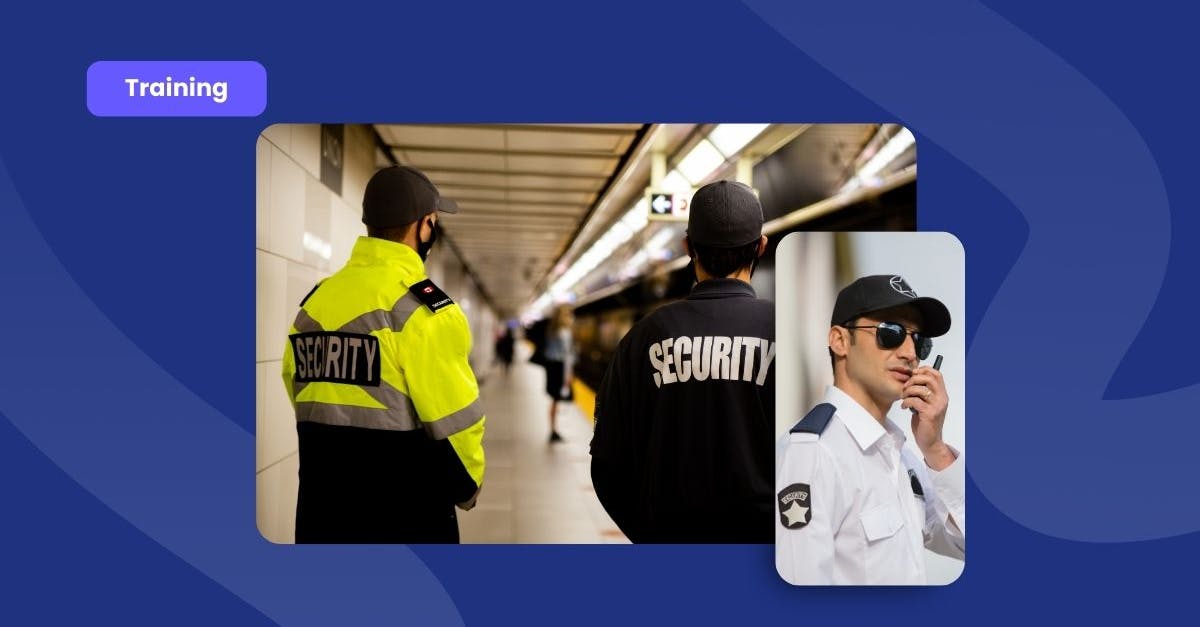12 Key Security Guard Training Topics
Published
December 4, 2024
Author
Share
Security guard training helps make sure that your security officers can effectively perform their duties, from protecting premises to dealing with various emergency situations. It’s also a good way to keep them from making mistakes that could harm your clients and legally damage your business reputation. This article will guide you through the most vital security guard training topics that you should definitely tackle in your next security guard training.
1. Duties and responsibilities
What are the duties of a security guard? The roles and responsibilities of security guards vary, and they often depend on the needs of their clients. Mostly, they’re in charge of protecting people and premises from any harm and crimes. Other times, they’re also needed to control the crowd, assess safety hazards around the area, and respond to emergencies. Keeping these things in mind, it’s crucial that you explain to them their duties and responsibilities before assigning them to a certain job.
Learning portal SC Training (formerly EdApp) offers an easy way to communicate this specific security guard training topic to your workforce. More specifically, its top-notch course creation tool can be used to create interactive courses where you can explain how to be a security guard. It’s free for up to 10 users, and it's very easy to use. With its drag-and-drop functionality, you can easily add text, move elements, and even include all sorts of media like images and videos to make your security guard training material more engaging.
Sign up for free and start using the best security guard training tool today!
2. Qualities of a good security officer
Another great security guard training topic that should definitely be included in your training would be the qualities that make a great security officer. It is the function of a security guard to be honest, self-disciplined, and professional. They should be able to communicate well, lead a team and follow their superior, and always be alert on the job. And most importantly, they should be consistent with their routine tasks and refrain from unlawful acts to gain the trust of their clients.
SC Training (formerly EdApp)’s The Role of Security Officers courses outline the character, attitude, and appearance that security professionals should possess, making it a great learning material to share with your team. This course follows a microlearning design model, meaning the topics have been broken down into short and targeted bursts. Your security team will only need a few minutes to complete this course, which is more convenient than requiring them to attend an hour-long security guard training session.
3. Patrol methods
What is security guard training without teaching your security team the different patrolling techniques and methods that will help them carry out their tasks more effectively? Guide them through different ways they can prevent crimes, catch any unlawful acts, and build positive relationships with the people they’re protecting.
The industry recognizes three major patrol methods that you should consider discussing with the workforce. One of these patrol methods includes foot patrol, which basically means patrolling using feet. This patrol method is usually used to deter any trespassers and monitor any broken doors or windows around the area. There’s also a vehicle security patrol that uses actual vehicles to roam around the vicinity and a remote patrol that uses surveillance technology to monitor specific areas.
4. Power of arrest
Many people have the misconception that security guards have the same arrest authority as police officers, which makes this specific security guard training topic a little confusing for others.
Security guards, while they’re in a uniform similar to police officers, have limited power when it comes to arresting a person. Only if a felony or certain crime has been committed in their presence can they arrest a citizen. The power of security guards to make an arrest differs significantly from that of police officers, who may do so regardless of whether a crime was committed in their presence. As long as they have probable cause to believe that a person has violated the law, they can restrain them for security reasons.
Before sending your security guards on duty, make sure that you clarify with them first the power they have when arresting someone. It’s also important to show them the right process for how to restrain a person and relay a complaint to a police officer, if needed.
5. How to handle emergency situations
When there are emergencies, security officers are often expected to take the lead. So, it’s vital that you teach your team how to respond the right way to emergencies, whether they involve a bomb threat or natural disasters like floods and earthquakes. When carried out properly, it can greatly minimize the level of impact from these catastrophes and protect the lives of those around them.
SC Training (formerly EdApp) has put together its course, Security Personnel’s Role in Handling Emergencies, which can be used to discuss the role of security officers in responding to general types of emergency situations. Here, they’ll learn how to react to fire emergencies and follow the fire evacuation plan, as well as locate an explosive device and assist with an investigation. The course will also guide them on how to respond to hazardous material incidents, especially if their employers are involved in producing or handling them.
This security guard training course can be accessed using any device, including laptops, tablets, and smartphones. It’s also designed to follow self-paced learning, giving your staff the flexibility to complete their training whenever and wherever they prefer.
6. Security communication
While often overlooked, communication is an essential skill that security professionals should have. This is primarily because most of their tasks involve a lot of communicating with people and relaying important information.
For example, security guards who are asked to check visitors before they enter a premise need to know the right way to greet them and make them feel comfortable. When there’s an emergency situation, they should also know how to effectively instruct others to prevent people from panicking and keep them safe.
But they should work on more than just verbal communication. It’s also necessary to teach your security personnel how to convey their message through writing, which can come in handy when they’re sending an email or proposal. It’s also important that they know the appropriate body language to avoid any conflicts due to misinterpretation and miscommunication.
7. Theft prevention
One of the key reasons businesses hire security teams is to protect their facilities from unlawful activities, particularly robbery. So, it just goes without saying that you should go over certain theft prevention ideas and techniques during your next security training session. After all, the better you prepare your security teams, the better they can deter thieves and keep a property secure.
If you’re looking for a learning resource that you can share with your team, then you might want to consider SC Training (formerly EdApp)’s Prevention of Theft from Commercial Premises course. This editable course covers various physical security solutions that security officers can employ to prevent thieves from breaking into a property and stealing valuable assets. There’s also a quick lesson that explains how they can respond with false alarms.
Feel free to use the course authoring tool to edit this free microlearning course and add any specific security guard awareness training topics that you might want to discuss with your team. You can also add more images and videos to make your content more engaging.
Prevention of Theft from Commercial Premises
Surveillance
Door Security
Detection of Intruders
Security Glazing
8. Access control
If you're wondering what are the responsibilities of a security guard that aren't commonly mentioned in descriptions, access control is one of them. Some businesses also hire security guards to carry out access control duties. This security measure’s primary goal is to stop burglars, thieves, and spies from breaking into a building and committing crimes.
During your training, make sure to demonstrate to your team how they can effectively screen and assist visitors entering the building, whether they have an appointment or not. Your security teams must also be aware of the proper procedures for verifying deliveries, as well as supervising contractors and maintenance personnel as they work on the property.
9. First aid
People often get injured when there’s chaos. They suffer from minor cuts to severe ones like heart attacks and broken bones. And being on the frontline in times of emergencies, it’s extremely beneficial that security guards know how to administer basic first aid, just at least until expert medical help arrives on the scene.
Treating cuts and scratches, small burns, sprains and strains, and splinters are some of the most useful first aid procedures that you might want to consider teaching to your security team. It’s also recommended to give them lessons on how to perform basic cardiopulmonary resuscitation (CPR), manage choking, and administer Epipen or Anapen.
10. Active shooter response
Security guard training requirements and security guard skills and qualities include being extremely vigilant to threats like active shooting. They need to have the necessary top guard training to recognize signs of potential violence, handle the situation to prevent it from escalating further and protect the people involved at all costs. To avoid this volatile scenario from ever occurring, your security officers should also know how to conduct security checks in facilities.
SC Training has a range of courses that you can use to educate your staff about this security guard training topic. Among the most relevant ones is the Active Shooter Response and Preparedness Course, which unpacks the key components of an effective active shooter response and preparedness program. You’ll also find its course on Active Shooter | School Full Lockdown Refresher Course helpful. Here, your security team will be taught the right response when an active shooting occurs on school grounds.
All SC Training courses, including these active shooting training courses, are free to use and share with your team (up to 10 users). To boost the success of your security guard training, you can use other useful SC Training features, such as the quiz app maker Rapid Refresher and spaced repetition tool Brain Boost (by request only).
11. Use of force theory
Security guards should understand when and how to use physical force in their duties. The Use of Force Theory teaches them the legal and ethical guidelines surrounding protective defense, making sure they respond appropriately to different situations.
You should emphasize that the level of force used should match the threat level faced. This way, teams can make informed decisions and act responsibly in high-pressure situations involving aggressive people.
12. Security technology
Understanding how security technologies work equips guards to monitor their environments effectively and respond to incidents quickly, leading to higher levels of safety. This training covers various tools and systems, such as surveillance cameras and access control systems, which enhance overall protection.
When discussing this topic, make sure you include troubleshooting issues and adapting to new tools. This will help your guards stay up-to-date and build their confidence when using equipment, allowing them to keep people and property safe.
Join our blog newsletter
Author
Jeanellie Avelino
Jen is a learning expert at SC Training (formerly EdApp), a mobile-based training platform that helps corporates and businesses bring their training solutions to the next level. She carries an extensive writing experience in a variety of fields, including architecture, the gig economy, and computer software. Outside of work, she enjoys her free time watching her favorite series and documentaries, reading motivational books, and cross-stitching.

